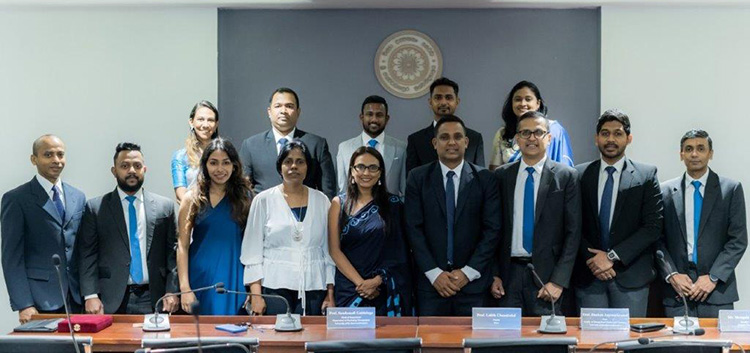Business
Lessons for Sri Lanka from Korea’s experience in innovation

The Lakshman Kadirgamar Institute of International Relations and Strategic Studies (LKI), in collaboration with the embassy of Republic of Korea in Sri Lanka hosted a seminar titled, “Economic Security in the Indian Ocean Region; Prospects for Collaboration between Sri Lanka and Republic of Korea” on August 21. It was attended by ambassadors and diplomats, representatives of international organisations, senior officials of the Ministry of Foreign Affairs and other relevant ministries and agencies, business persons, leading researchers and university students.
Extracts of an LKI press release: ‘Welcoming the gathering, Executive Director of the LKI, Ambassador Ravinatha Aryasinha, said the main purpose of the seminar was to examine the lessons Sri Lanka could learn from ROK’s experience in science and technological innovation. Setting the context for the event, Ambassador Aryasinha highlighted the current shortcomings in the country’s R&D efforts noting that the country’s annual R&D expenditure stands at a low 0.12% of GDP. He hoped that the discussion would address this lacuna and suggest tangible proposals on how to cultivate a more innovative society that values research and development and specific projects that can be operationalized in this regard.
‘Miyon Lee, Ambassador of Korea in her opening remarks highlighted Korea’s historical and ongoing efforts in transforming its economy globally, with a focus on economic security to protect supply chains and ensure technological leadership. She identified two critical elements for achieving this transformation: ‘Intellectual Property Rights (IPR) protection’ and the development of an ‘innovation ecosystem’. Ambassador Lee also highlighted the relevance of this discussion for contemporary Sri Lanka, which is emerging from an economic crisis and is seeking to adopt export-oriented policies and attract more Foreign Direct Investments (FDI). She outlined three key aspects of Korea’s economic transformation. First, Korea has greatly benefited from the global liberal market system, rule of law, and democratic values. Second, the private sector and civil society play a crucial role in driving innovation and resilience. Third, effective political leadership and bureaucratic efficiency are essential for implementing necessary policies. She also emphasized Korea’s vision for a free, peaceful, and prosperous Indo-Pacific region.
‘Dr. Kyungjin Song, Country Representative of the Asia Foundation Korea Office, led the first session of the seminar. Her presentation focused on the evolution of Korean economic statecraft over the past sixty years and explored potential future collaborations between Sri Lanka and South Korea. She highlighted three key elements of Korea’s economic development: institution building and capacity building, innovation, and entrepreneurship.
‘Dr. Song noted that in 1962, when Korea launched its first five-year economic development plan, its major exports included iron ore, tungsten, anthracite, raw silk, and squid. By 2023, ROK’s primary exports had shifted to semiconductors, automobiles, petrochemicals, synthetic resin, auto parts, and ship building. In her presentation, Dr. Song highlighted a crucial moment in Korea’s economic history. She described how, during the late 1960s and early 1970s, as many Korean students were emigrating to the U.S. for higher education, ROK made a strategic move. The establishment of the Korea Development Institute (KDI) was a key initiative by the Korean government to harness global talent.
‘Dr. Song explained that KDI’s leadership, under the president’s direction, traveled abroad to engage with these scholars, experts, and bright minds, persuading them to return to ROK to contribute to ROK’s economic development. This played a crucial role in Korea’s rapid economic transformation. Dr. Song also shared valuable lessons from the 1997 Asian Financial Crisis and the 2008 Global Financial Crisis, and proposed potential areas for collaboration between Sri Lanka and the Republic of Korea. She suggested opportunities in renewable energy investments and noted that Sri Lanka’s graphite, an essential raw material for South Korea’s semiconductor, battery, and automobile industries, could be a valuable resource for future cooperation.
‘The panel discussion that followed was moderated by Prof. Ajith De Alwis, Chief Innovation Officer of the National Innovation Agency (NIA) and Senior Professor of Chemical and Process Engineering, University of Moratuwa. The four member panel included Dr. Kyungjin Song – Country Representative of the Asia Foundation Korea Office, Prof. (Dr.) Nishantha Sampath Punchihewa – Dean of the Faculty of Law, University of Colombo and former member of the Intellectual Property Advisory Commission, K.A.Vimalenthirarajah – Director General of the Department of Trade and Investment Policies, Ministry of Finance, and Anushka Wijesinha – Co-founder/Director of Centre for a Smart Future.
‘The question and answer session that followed centered on several key points: the need for supportive policies to boost business activity in the country, leveraging areas where Sri Lanka has competitive advantages and core competencies, such as traditional knowledge, that require minimal investment. The discussion also highlighted the importance of the private sector investing in R&D rather than waiting for government action. Encouraging the diaspora community to seasonally or remotely contribute to Sri Lanka’s economic processes was suggested as a way to address brain drain. Additionally, the government’s strategy of diversifying markets from western to eastern regions while maintaining western market connections was examined. The session also emphasized the need for consistent policy focus, strong political leadership to promote innovation, and seeking investments in R&D in moving up the value chain in existing sectors rather than pursuing entirely new ones.’
Business
Browns Investments sells luxury Maldivian resort for USD 57.5 mn.

A five star 100-room Maldivian resort hotel property controlled by Browns Investments PLC has been disposed for USD 57.5 million, Browns Investment said in a stock exchange filing on Friday. The company had previously disclosed in September that the deal was in the pipeline pending completion of precedent conditions.
The property. Barcelo’ Whale Lagoon Maldives, belonged to Browns Ari Resort (Private) Ltd., a subsidiary of Browns investments, was purchased by ASB Hotel Properties Maldives Private Ltd.
“The transaction was completed following the satisfaction of the conditions precedent set out in the Sale and Purchase Agreement, for a total consideration of USD 57,500,000,” the filing said. The price was considered “significant” but was not the highest in the Maldives where high end hotel properties command top dollar.
Browns Investments (BIL) has a significant presence in the Maldives, developing multiple properties, notably through partnerships with Spain’s Barceló Hotel Group for projects like Barceló Whale Lagoon (now sold), Barceló Nasandhura (city hotel/apartments), and the Bodufaru Beach Resort (a major integrated project with three hotels) in North Male Lagoon, with BIL aiming to be a major Sri Lankan hotel operator in the Maldives with large room capacity.
BIL’s key Maldives projects are:
Bodufaru Beach Resort: A large-scale development in North Male Atoll with three five-star hotels, a significant undertaking with Barceló Hotel Group and Syno Hydro Corporation.
Nasandhura Palace Hotel (Barceló Nasandhura): A luxury city hotel and apartment complex in Male, managed by Barceló.
Strategy & Partners:
Browns Investments partners with Barceló Hotel Group, a Spanish hotel chain, for management and investment in their Maldivian properties.
The company aims to become the largest Sri Lankan hotel investor and operator in the Maldives, significantly expanding its room keys in the region, as described on the Browns Investment website.
Browns Investments is actively developing and managing luxury hotel properties in the Maldives, focusing on large integrated resorts and city hotels, leveraging international partnerships to grow its presence in the high-end tourism market, according to the company.
Business
Marketing Alumni Association of USJ Outlines Strategic Vision to Strengthen the Future of Marketing in Sri Lanka

The Marketing Alumni Association (MAA) of the University of Sri Jayewardenepura (USJ) set out its strategic direction for the year ahead at its Annual General Meeting (AGM) held on 10 December 2025. The event brought together academic representatives from the Department of Marketing Management and a strong contingent of alumni, providing a platform to review the association’s progress and reaffirm its commitment to advancing the marketing profession in Sri Lanka.
As the official body representing graduates of the Department of Marketing Management of the University of Sri Jayewardenepura, the MAA has, over the past 25 years, supported a network of more than 1,500 marketing professionals who now hold influential roles in leading private and public sector organizations. The association remains committed to elevating the standing of the Japura Marketing degree by strengthening industry partnerships, supporting academic excellence, and fostering a high-performing alumni community.
A key focus of the AGM was the appointment of Oshadee Withanawasam as President of the MAA for the upcoming term (2025-2027). In his inaugural address, Mr. Withanawasam emphasized the importance of strategic leadership, industry relevance, and collaborative growth in positioning USJ and its alumni at the forefront of marketing innovation in Sri Lanka.
Over the past year, the MAA has intensified its engagement efforts through a series of high-impact initiatives. The Kings and Queens Dinner Dance 2025, which brought together over 200 members, strengthened camaraderie within the alumni network. On the academic front, the association’s flagship ‘Fine Touch’ guest lecture series, conducted in partnership with the Department of Marketing Management, USJ, continued to offer undergraduates valuable exposure to industry best practices and emerging trends.
A significant milestone for the association was the launch of its first structured mentoring program for undergraduates of the department. This initiative marks a notable advancement in bridging academic training with practical corporate experience, equipping students with the competencies required to excel in a competitive business environment.
The MAA also continued to deliver meaningful social impact through its ‘Bring a Smile’ initiative, which has supported rural schoolchildren for three consecutive years (2023–2025) by providing essential stationery supplies. Further strengthening its commitment to education, the association introduced a scholarship scheme in 2024 to support deserving undergraduates pursuing their higher education in marketing.
During the AGM, outgoing President Dr. Darshana Jayasinghe and the Head of the Department of Marketing Management of USJ, Prof. Sandamali Galdolage, commended the association’s continued progress and reiterated their support for its long-term vision.
The following office bearers were appointed for the new term: Oshadee Withanawasam (President), Amitha Amarasinghe (Deputy President), Nipuni Karunarathna (Vice President), Vimukthi Kaushalya (Secretary), Thisaru Menake (Assistant Secretary), Nuwan Indika (Treasurer), and Thilanka Kalpage (Assistant Treasurer). Committee Members for the term include Prof. Ashoka Malkanthie, Chandra Kodithuwakku, Manuri Jayasinghe, Champika Vincent, Naleendra Yasassri Perera, Kaushan Agalawatte, Chandranath Gamage, and Pamudi Ketawalage.
Dr. Darshana Jayasinghe and Lalith Sumanasiri will serve as Advisors, while Prof. Sandamali Galdolage, Manojee Dabare, and Prof. Lalith Chandralal will continue as Trustees of the MAA.
Business
18 certified sales training consultants graduate at BMICH

A graduation ceremony for 18 Certified Sales Training Consultants, qualified to mentor aspiring marketing professionals and enhance standards in the country’s sales sector, was held recently at the Bandaranaike International Conference Hall.
The graduates represent the first phase of a programme aimed at producing 50 Certified Sales Training Consultants nationwide. The training and certification were conducted by the Asian College of Sales and Marketing (ACSM).
According to ACSM Director and Learning Consultant Sugath Munasinghe, the need for professionally certified sales training consultants to raise the quality and effectiveness of the sales sector has been identified for some time. He added that ACSM, as a higher education institute, will continue to provide structured training and certification to meet this demand.
-

 Midweek Review5 days ago
Midweek Review5 days agoHow massive Akuregoda defence complex was built with proceeds from sale of Galle Face land to Shangri-La
-

 News4 days ago
News4 days agoPope fires broadside: ‘The Holy See won’t be a silent bystander to the grave disparities, injustices, and fundamental human rights violations’
-

 News4 days ago
News4 days agoPakistan hands over 200 tonnes of humanitarian aid to Lanka
-

 News5 days ago
News5 days agoBurnt elephant dies after delayed rescue; activists demand arrests
-

 Business3 days ago
Business3 days agoUnlocking Sri Lanka’s hidden wealth: A $2 billion mineral opportunity awaits
-

 Editorial5 days ago
Editorial5 days agoColombo Port facing strategic neglect
-

 News3 days ago
News3 days agoArmy engineers set up new Nayaru emergency bridge
-

 News5 days ago
News5 days agoSri Lanka, Romania discuss illegal recruitment, etc.













